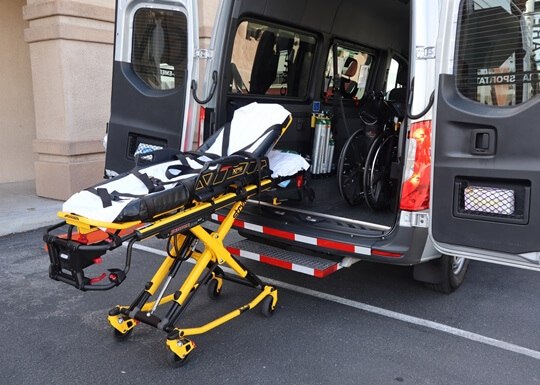Streamlined Medical Transportation Services Near Me: Making Sure Convenience and Treatment
Streamlined Medical Transportation Services Near Me: Making Sure Convenience and Treatment
Blog Article
Available and Affordable Medical Transport Options for Seamless Health Support
In the realm of health care, the access and cost of clinical transportation are vital in guaranteeing people can access the care they require when they need it. The capability to flawlessly browse transportation alternatives can substantially affect an individual's capacity to get timely clinical attention, follow-up treatment, and total well-being. From non-emergency clinical transport solutions to innovative options like telehealth, the landscape of medical transport is developing to satisfy the varied demands of patients. Thinking about the significance of this facet in health care delivery, discovering the array of choices offered comes to be crucial for addressing voids in ease of access and price.
Non-Emergency Medical Transportation Solutions

These services are staffed by trained specialists that focus on individual comfort and safety during transportation. Drivers are geared up to deal with people with differing clinical requirements and guarantee that all trips are smooth and stress-free - Medical Transportation Services Near Me. Additionally, non-emergency clinical transportation solutions often use specific automobiles that are wheelchair-accessible, making them appropriate for a large range of individuals with various movement requirements
Volunteer Vehicle Driver Programs
Volunteer chauffeur programs are important in offering transportation aid for people looking for non-urgent treatment. These programs count on the generosity of volunteers who contribute their time and vehicles to help transportation patients to and from medical consultations. By using volunteer drivers, organizations can supply a cost-effective option for individuals who might not have accessibility to reliable transport.
Among the essential benefits of volunteer driver programs is the personalized treatment and focus that individuals get. Unlike traditional transportation services, volunteer drivers often develop a connection with the individuals they help, developing a compassionate and encouraging environment during what can be a difficult time. Additionally, volunteer driver programs can aid bridge the gap for individuals residing in underserved or country areas where mass transit options might be restricted.
Mass Transit Options

One of the key advantages of public transportation is its widespread accessibility in rural and city areas alike. This extensive network allows people from diverse backgrounds to take a trip to clinical visits with family member simplicity. Additionally, mass transit systems are commonly equipped to fit people with disabilities, providing easily accessible travel options for those with movement challenges.

Ride-Sharing and Transport Network Companies
The evolution of contemporary transport alternatives for medical functions extends past conventional public systems like trains and buses to include the ingenious world of ride-sharing and transport network business. Ride-sharing solutions such as Uber and Lyft have reinvented the method people travel to have a peek at this website medical appointments, providing ease and adaptability to people that may not have accessibility to their try this cars or traditional public transport. These platforms permit users to ask for an adventure with the touch of a button on their smartphones, supplying door-to-door solution that can be especially advantageous for individuals with flexibility difficulties or those calling for help.
Transportation network firms (TNCs) have actually also played a considerable role in linking the gap in clinical transportation solutions. Firms like Veyo and RoundTrip focus on non-emergency clinical transport, satisfying patients who need a greater degree of support during their trips to medical facilities. By partnering with doctor and insurance firms, TNCs make sure that patients can access trusted and timely transport remedies, ultimately contributing to boosted health and wellness outcomes and client contentment.
Telehealth and Online Consultations
Enhancing health care access and comfort, telehealth and digital examinations have become essential components in contemporary clinical methods, reinventing the way individuals connect with medical care providers. Telehealth leverages technology to promote remote interaction in between clients and healthcare specialists, supplying a broad variety of solutions such as online examinations, remote monitoring, and digital prescriptions. Virtual consultations make it possible for people to look for clinical recommendations, medical diagnosis, and therapy click to find out more from the comfort of their homes, getting rid of the requirement for physical check outs to healthcare facilities. This approach not only conserves time and decreases transportation costs for individuals however additionally improves the general performance of medical care distribution.
In addition, telehealth plays an important function in prolonging medical services to underserved neighborhoods, backwoods, and individuals with minimal mobility. By damaging down geographical obstacles and increasing medical care outreach, telehealth promotes very early intervention, continuity of treatment, and person engagement. As technology remains to development, telehealth is positioned to play a significantly significant role in forming the future of health care distribution, cultivating enhanced wellness outcomes and client fulfillment.
Verdict

From non-emergency clinical transport solutions to ingenious services like telehealth, the landscape of clinical transport is advancing to satisfy the diverse requirements of individuals.Non-Emergency Medical Transportation Services facilitate the secure and timely transportation of individuals requiring non-urgent clinical care to and from healthcare facilities.The evolution of contemporary transportation alternatives for medical functions prolongs beyond standard public systems like buses and trains to encompass the innovative realm of ride-sharing and transport network firms.Transport network companies (TNCs) have actually also played a substantial duty in bridging the space in medical transportation solutions. Non-Emergency Medical Transport Providers, Volunteer Vehicle Driver Programs, Public Transport Options, Ride-Sharing and Transport Network Business, and Telehealth and Virtual Consultations all play a vital role in attending to transportation barriers to health care accessibility.
Report this page